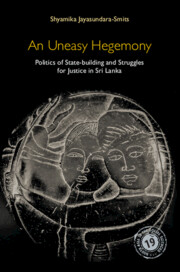‘Shyamika Jayasundara-Smits An Uneasy Hegemony: Politics of State-building and Struggles for Justice in Sri Lanka is a welcome addition to the growing body of new scholarly literature on Sri Lanka’ politics that has emerged after the end of the protracted ethnic war. The war and violence that engulfed the entire society for over three decades had also shaped and defined the possibilities as well as the limits of the agenda and orientations of the country’s social science scholarship for some time. Being able to move out of the shadow of the conflict, Jayasundara-Smits reframes and then re-examines the problematic of state building in post-colonial Sri Lanka by focusing on the connections between the hegemony building processes and the politics of the state-building project. The book provides refreshingly new material as well as interpretive insights into the inevitable tensions between the two parallel projects, hegemony building and state building.’
Jayadeva Uyangoda - Professor Emeritus in Political Science, University of Colombo, Sri Lanka
‘A very fine analysis laced with irony that moves away from the prism of ethno-religious conflict to give centrality to class in the process of state building in late colonial and postcolonial Sri Lanka. Shyamika Jayasundara-Smits convincingly challenges the constructed ontology of ethnicization. This deeply rooted investigation guides us with deft precision through the various incarnations of Sinhala Buddhist ideology and patronage politics towards a devastating conclusion. An original and eloquent book.’
Nira Wickramasinghe - Chair and Professor of Modern South Asian Studies, Leiden University Institute for Area Studies, The Netherlands
‘This book offers readers a fresh intersectional lens for understanding politics in Sri Lanka. Drawing on studies of nationalism, decoloniality, and class, the book analyzes ‘hegemony-building processes.’ Drawing up her personal experiences growing up in Sri Lanka and her expertise in conflict transformation and peacebuilding, the author offers a significant contribution to the analysis of war and peace, polarization and repression in Sri Lanka.’
Lisa Schirch - Richard G. Starmann Sr. Professor of the Practice in Peace Studies, Keough School of Global Affairs, Kroc Institute for International Peace Studies, University of Notre Dame, USA
‘This book engages in, and makes an important contribution to, longstanding debates on the trajectory and character of Sri Lanka’s postcolonial state. Though ostensibly now a post war state, it remains a state in crisis. This lends urgency to the task of better understanding the historical and contemporary politics of statebuilding in Sri Lanka. The author eschews a narrow focus on ethnicity and armed conflict, instead providing a more intricate and integrated analysis of the discursive, political and economic factors that have shaped Sri Lanka’s contested trajectory. At a time of a global resurgence of populist and authoritarian politics, it is important to look carefully at the particular conditions that give rise to such projects, as this book does so admirably.’
Jonathan Goodhand - Professor of Conflict and Development Studies, SOAS, University of London



